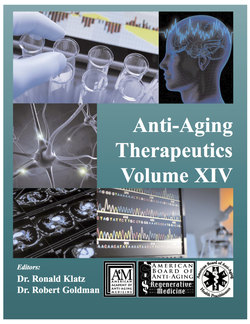Читать книгу Anti-Aging Therapeutics Volume XIV - A4M American Academy - Страница 57
На сайте Литреса книга снята с продажи.
Thyroid Hormones
ОглавлениеThe physiological effects of iodine at nutritional levels relate to the effects of thyroid hormones, these include:
1.Regulation of basal metabolic rate;
2.Regulation of macronutrient metabolism;
3.Regulation on ion transport – muscle contraction;
4.Regulation of development, growth and sexual maturation.10
Iodine is first taken from circulation into the thyroid via a sodium-iodide symporter pump. It is then concentrated in the colloid space inside follicles formed by thyrocytes. After entering the colloid, it is oxidized via thyroid peroxidase (TPO) to allow it to bind with tyrosyl residues from tyrosine within the protein thyroglobulin (Tg). These complexes form monoiodotyrosine (T1) and diiodotyrosine (T2). Within thyroglobulin, these condense together to form thyroxine (tetraiodotyrosine - T4) and triiodotyrosine (T3). In response to thyrotropin (or thyroid stimulating hormone – TSH), iodinated thyroglobulin is taken into the peripheral follicular cells in droplets via pinocytosis. These droplets are broken down by lysosomes and proteolytic enzymes, freeing the T3, T4, and T2 from the thyroglobulin and releasing them into the circulation.11
T4, the predominate hormone in circulation, is a prohormone requiring 5’ deiodination to be activated into T3. Type 1 deiodinase does this for systemic use in the liver and kidneys, while Type 2 deiodinase does this for local use in the brain, brown fat and pituitary gland.12 T4 is also deiodinated into reverse T3 (rT3), as a means of peripherally deactivating T4 and degrading it. Contrary to claims of advocates of ‘Wilson Temperature Syndrome’, the presence of rT3 does not stimulate more rT3 formation, rather it inhibits it.
